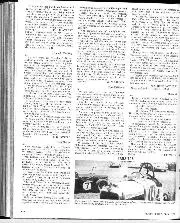
Tailpiece
We've heard a lot about EEC and other restrictions on old cars. Let us hope, however, that roll-over bars will not become compulsory here, as in Australia.
“SMUGGLER’S COME-BACK.” THE FIRST STORY TO BE SELECTED IN OUR JOHNSON MOTOR COMPETITION.
FIFTY years ago he was pilot for the sailing vessels out of Kenmare, and he was eighty. He regarded the Cockleshell and her outboard Johnson Motor with the distaste a god might feel towards a very small demon.
“Why, in thim days,” he said, of a piratical past, “the ‘ Mary ‘ wad run the Bay in thirty minutes, wid a follying wind.” His expectoration closed all argument. He turned his ancient back and shuffled to the road gate beyond the beach to meet an approaching figure.
I’d only had Cockleshell three weeks, bringing her with me to Drimeenagh when vacation started, and we had spent most days coasting along the northern shore of the Bay. I had not ventured far afield, for the Bay mouth is unsheltered and I mistrusted the Cockleshell’s reactions to an Atlantic swell.
The ancient mariner and his companion came across again to the quay.
“Wad that git yez to Ardfert ? ” He indicated a point on the southern coast, ten miles away.
“Yes, of course.” Inexperience spoke.
“Himself says me aunt’s afther dyin’, and they’re wakin’ her this avenin’. I must go. Let ye git her started.” Taking my assent for granted he buttoned his coat as a preparation for the voyage. Cockleshell was fuelled, but the tide was flowing, with fully three hours before the turn, and it was already sunset. I was unfamiliar with the Bay currents and the coast is treacherous. It would be dark before we could reach the other side, and with a strong wind and a heavy sea on the starboard bow—
O’Neill, I think, .read my mind. “Are yez comin’ ? ” I followed him down into the Cockleshell, where he sat in the bows. I started the Johnson and nosed out from the jetty. We made a spectacular broadside, O’Neill clutching his seat as we made for the open sea. Cockleshell leaped alive as I opened the throttle, and set a course south for Ardfert.
A green wall of water rose on our starboard side ; we crested it by a miracle, the propeller churning the air. My stomach heaved unhappily as we breasted the next wave, and shipped many gallons of water. From its crest I saw an endless:pro _
cession of white horses, and beyond the jagged jaws of the Dogs of Bullig. Then we were in the trough, and I remember feeling sorry for O’Neill. Suddenly he was beside me, and had the tiller, bringing her nose round to the swell.
“Let yez mind the machinery,” was all he said.
Fifty years he had been a pilot and:runner of contraband, and in his eightieth summer he took his first motorboat trip (so nearly proving his last) with me, and brought us safely across the miles of Atlantic into the lee of Ardfert in forty minutes !
I was feeling decidedly green, and wet and stiff. O’Neill’s friend who met us on the quay informed us that his aunt, so far from being dead, was celebrating her one-hundred-and first birthday.
“And is no one dead ? ” asked O’Neill. “We came for a wake, and its disappointed he’ll be, the gossoon here. It could be the birthday’s as good.”
The whisky was, anyway.
If the potato crop is good this year, O’Neill is buying a Johnson to fit to his dinghy.